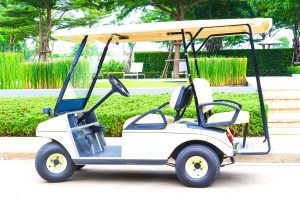Fort Myers Injury Lawyer Warns of Florida Golf Cart Owner Liability
 Golf cart owners in Florida, listen up! You could be held legally responsible if someone is hurt in a golf cart accident involving your golf cart, even if you weren’t the one operating it. As a Fort Myers injury lawyer can explain, you have a duty as the owner of that golf cart to avoid handing over the keys to someone who is careless. That could include someone you know if they drive recklessly, has a history of drunk driving or a teenager without much driving experience; this same law applies even if the person who you loan the cart to has a good driving record and has no history of driving issues. This is especially true if the golf cart is going to be operated on a public road with cars.
Golf cart owners in Florida, listen up! You could be held legally responsible if someone is hurt in a golf cart accident involving your golf cart, even if you weren’t the one operating it. As a Fort Myers injury lawyer can explain, you have a duty as the owner of that golf cart to avoid handing over the keys to someone who is careless. That could include someone you know if they drive recklessly, has a history of drunk driving or a teenager without much driving experience; this same law applies even if the person who you loan the cart to has a good driving record and has no history of driving issues. This is especially true if the golf cart is going to be operated on a public road with cars.
Golf carts were designated as “dangerous instrumentalities” – the same as motor vehicles – in the 1984 Florida Supreme Court case of Meister v. Fisher. Because a dangerous instrumentality is deemed inherently dangerous, their owners can be found directly and/or vicariously liable when someone is hurt while operating it negligently. It doesn’t matter if the owner wasn’t the operator, so long as the operator had the owner’s permission.
That point was underscored in a recent Florida injury lawsuit that resulted in a multi-million dollar damage award.
The case in question was out of Miami-Dade County, where a 12-year-old boy suffered catastrophic and permanent injuries in a golf cart accident in 2016. A motor vehicle struck a golf cart full of minors at an intersection – but only after the golf cart operator, 16-years-old, blew past a stop sign. The golf cart flipped and the occupants – all under 18 – were ejected. Two were left in critical condition, including the plaintiff in this case.
Golf Cart Owner Ordered to Pay $50 Million for Florida Golf Cart Accident
The owner of the golf cart was the 16-year-old’s step-uncle. A trial court determined the golf cart owner authorized the teen to drive the golf cart around the neighborhood with the golf cart owner’s son and three other friends. One of those was the plaintiff.
After the accident, the boy’s parents sued both the operator of the golf cart and the owner in the case of Gonzalez v. Chiong. (The driver of the car was not negligent in this case, and therefore was not named as a defendant.)
Before trial, the driver of the golf cart/his parents entered into a consent judgement with the injured boy’s parents for $18 million. Attorneys for the golf cart driver asserted his operation of the golf cart was covered under his parents’ auto insurance policy, as it was a “non-owned auto.” The insurance company, of course, pushed back, arguing that the policy didn’t cover golf cart accidents because a golf cart “doesn’t meet the definition of a private passenger auto.” The trial court agreed with the insurer, granting them summary judgment, but that was later reversed by the 11th Judicial Circuit Court, which ruled the golf cart was covered under the auto insurance policy.
Trial proceeded against the owner of the golf cart proceeded, with plaintiffs arguing he owed the young passenger and his parents a duty of care, negligently breached that duty by entrusting the golf cart, and therefore should be liable for his injuries. The trial court sided with plaintiffs, ordering the golf cart owner to pay a total of $46 million in past and future economic and non-economic damages, and another $4 million to his parents for loss of consortium.
It’s important to note that while the court in this case found the golf cart owner directly negligent for entrusting the golf cart to his 16-year-old step-nephew, other courts have applied the dangerous instrumentality doctrine in Florida golf cart accident cases and found the golf cart owners vicariously liable. That means the court wouldn’t even need to find that the owner was negligent in handing over the keys to another. It would be sufficient to show they gave the operator permission, and that operator subsequently acted without care and caused someone else to get hurt. Continue reading





 Florida Personal Injury Lawyer Blog
Florida Personal Injury Lawyer Blog



 Golf carts were designed with the goal of making it easier for golfers to efficiently traverse the long stretches on the green. But here in South Florida, they’ve become fairly ubiquitous in residential neighborhoods, with operators ranging from spritely senior citizens to carefree kids as young as 8 or 9. It’s also not uncommon to spot them in mobile home communities, airports, sporting events, or at amusement parks. As a Fort Myers golf cart injury lawyer can explain, the presence of golf carts on Florida roadways has led to an increase of dangerous collisions with cars and pedestrians, as well as tipping and rollovers.
Golf carts were designed with the goal of making it easier for golfers to efficiently traverse the long stretches on the green. But here in South Florida, they’ve become fairly ubiquitous in residential neighborhoods, with operators ranging from spritely senior citizens to carefree kids as young as 8 or 9. It’s also not uncommon to spot them in mobile home communities, airports, sporting events, or at amusement parks. As a Fort Myers golf cart injury lawyer can explain, the presence of golf carts on Florida roadways has led to an increase of dangerous collisions with cars and pedestrians, as well as tipping and rollovers.






